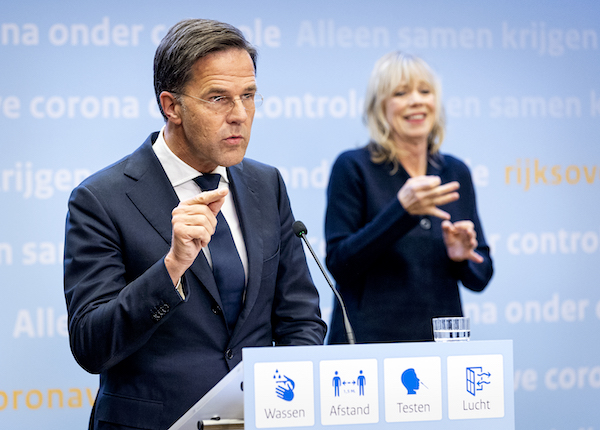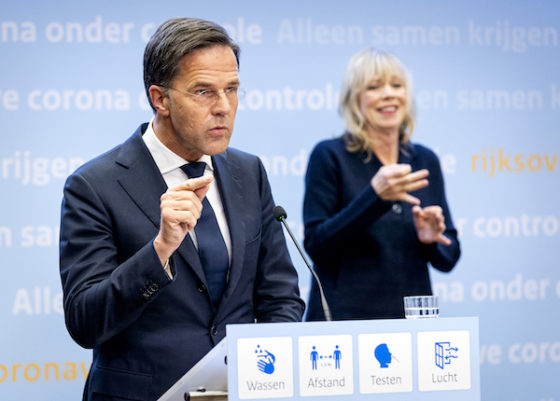Dutch go for ‘short, sharp shock’ as coronavirus cases soar


The Netherlands is pressing ahead with what prime minister Mark Rutte has described as ‘a short, sharp shock’ to drastically reduce contacts between people and hopefully limit the spread of coronavirus.
The new rules come after the number of new infections in the Netherlands soared to over 16,000 a day and hospitals are being forced to cancel operations because coronavirus patients are taking up so many beds.
The new measures come into effect on Saturday at 6pm, and include an 8pm closing time for cafes, supermarkets and restaurants, mandatory seating in bars and at events, and no supporters at both amateur and professional sports matches.
The measures also include a 75 limit on the number of people attending college and university lectures and a 6pm closing time for sex workers, casinos and all contact professions. They will initially run for three weeks.
The aim, said Rutte, is to slow the spread of the virus in the coming weeks ahead of the introduction of new laws which are ‘more appropriate given that most people are vaccinated.’
‘The measures will have an impact on many people,’ he said. ‘We have had long and intensive talks because there are so many interests at stake. It is very complicated.’
Financial support
Employers will be able to claim financial help for lost income, but those details are still being worked out, Rutte said. ‘We will do it fully and decently. We aim to be generous to the sectors which are being affected.’
In the meantime, ministers are working on new legislation which will expand the use of the coronavirus pass – the QR code which shows if someone has been vaccinated, had a negative test or recently had the virus.
Health minister Hugo de Jonge said that people who have not been vaccinated are more likely to get sick and to end up in hospital. ‘The question is,do we have to close down parts of society or can we keep it as open as possible with the coronavirus pass,’ he said.
Non food shops
The legislation will cover the introduction of the coronavirus pass in non-essential shops and at work – if employers want to use it. It will also make it possible to introduce the QR codes in higher education.
Festival and other organisers of events without fixed seating will also be able to limit admittance to events to people who have either been vaccinated or recently had the virus – the so-called 2G system.
‘There is more risk for people who have not been vaccinated’ if they pick up the virus at a mass event, De Jonge said. ‘They are 17 times more likely to end up in hospital and 33 times more likely to end up in an IC unit.’
Free choice
De Jonge denied this is, in effect, compulsory vaccination. ‘There is a free choice,’ he said. ‘But choices have consequences. Do we have no cafes and no events, or do we only allow the people who are vaccinated, and therefore protected, to attend?’
Asked if the Netherlands should not have done more to expand hospital and IC capacity, De Jonge said this had been done over the past 18 months. ‘At the moment we are trying to keep regular care going, which was not the case last year,’ he said.
Scaling up the number of IC beds, he said, means there will not be enough capacity for regular care.
MPs will debate the new measures next Tuesday.
Thank you for donating to DutchNews.nl.
We could not provide the Dutch News service, and keep it free of charge, without the generous support of our readers. Your donations allow us to report on issues you tell us matter, and provide you with a summary of the most important Dutch news each day.
Make a donation